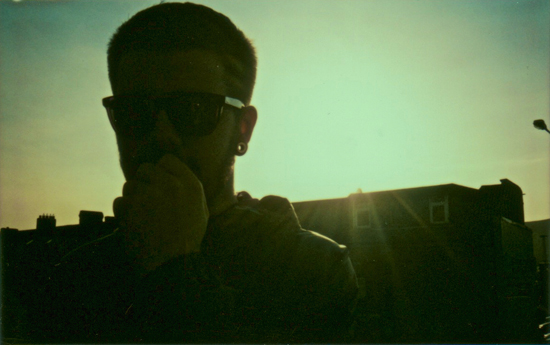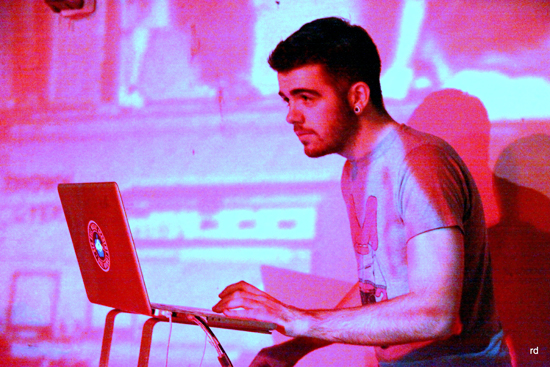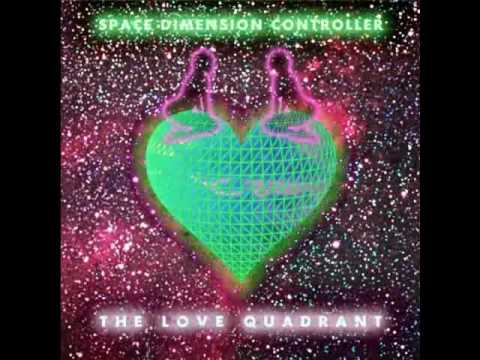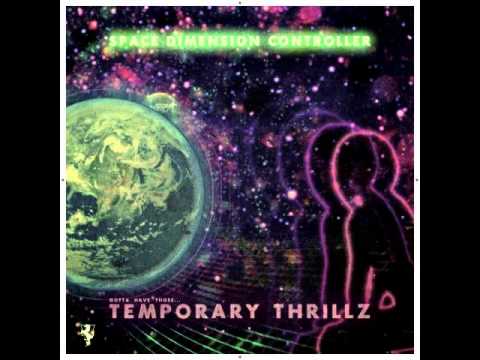Mr. 8040 is spaced out. The Space Dimension Controller himself was out late last night, laser weaponry in full-force at London’s fabric club, and crash landing in the R&S office mid-afternoon, he slumps deep into the couch. Leaving the cosmos behind for an hour or so, he assumes his human alter ego – one Jack Hamill, resident of Belfast – and introduces himself with a tired half-smile. We’re meeting to speak about his most recent mini-album, last November’s Pathway To Tiraquon 6, as well as his upcoming debut full-length proper, which he’s currently in the process of recording and is slated for release later in 2012. In conversation he’s far less flashy than his music – though that’s admittedly not difficult – and possessed of a bone dry sense of humour that makes our conversation surprisingly difficult to accurately translate to the written word. This, in fact, is one of the few times he’s given an interview in human form. "I usually do them over email and in character, so I don’t usually do them as me," he says with a wry smile. "I wouldn’t be able to do the character in person. If I could, I would."
You had me wondering, actually.
"Maybe I’ll do that after the album," he grins. "I’ll take it to the next level."
It’s a rarity to find Hamill touching back down to earth. Since the release of his 2009 debut 12", The Love Quadrant, he’s been heading outward into the far reaches at an ever accelerating pace, borne away by both his music and the loosely woven narrative surrounding it. ‘The Love Quadrant’ turned a number of heads upon its release through Boxcutter’s Kinnego label, simply because it was so precociously full-formed for a debut release. Opening with long, lustrous chords that slowly parted like interstellar gas clouds, over four minutes it slowly resolved into a sensuous and very showy hybrid, somewhere between slow house, elevator Muzak and the gaudiest excesses of 80s funk. Complete with call-and-response chatter between cyborg female vocals, drenched in autotune, and Hamill’s own downpitched voice as intergalactic lothario 8040, it was made all the more impressive by the fact that he was still a teenager at the time of its release.
A number of releases since, through the rejuvenated R&S, picked up where his debut left off. The aesthetic he’s developed is rather unique in today’s over-exposed and trend-driven electronic music landscape, as Hamill’s music and artwork essentially operate outside of rapidly-shifting net time. That’s partly down to their slightly archaic feel, all saturated reds, pinks and blues and Tron-esque blocky structuring, as well as his music’s closest sonic touchstones being the overdriven textures and rhythms of older Detroit techno and electro (one reason his presence on R&S, a label closely associated with that sound, feels so appropriate; he’s also remixed Detroit heroes Model 500 and Anthony ‘Shake’ Shakir). That’s bolstered by a storyline to match – a sort of rickety hybrid of Battlestar Galactica, Star Wars and any number of dystopian future novels and computer games, where the sun has been destroyed by aliens and the people of earth have fled to a planet in a new region of space called Mikrosector-50. There’s also his addiction to analogue synthesisers and vintage gear, something he says began at the age of 17, when "I begged my mum to get me a rackmount Moog Voyager for Christmas".
Then there’s the crucial factor, the all-pervasive presence of The Funk: shuffly, swung drums that move his tracks along through long, sensual arcs; fat, cocaine-crisp, wiggly-worm synth-lines equally reminiscent of 80s heavy metal guitar solos and some zero-gravity strain of G-funk; Hamill’s occasional baritone cameo as sci-fi sex pest 8040. All were out in full force on 2010’s Temporary Thrillz EP, though Pathway To Tiraquon 6 offered something subtly different: brittle, rattling percussion that betrayed the influence of older Warp and Planet Mu material and, during its final minute, a fantastic and funny trailer for this year’s upcoming full-length. Suggesting it would be called Welcome To Mikrosector-50, it features 8040 in full flow, preparing listeners for what’s to come:
"Get ready for a new experience in galactic funk."
I wanted to start with a bit of history behind your music. ‘The Love Quadrant’ was quite a complete sound already – had you been working on music quite a lot up to that point?
Jack Hamill: I started [making tunes] on New Years Day 2006. At first it was like ambient music, then IDM stuff, and then I got into Drexciya and 80s electro stuff, and that’s how the whole thing formed. Space Dimension Controller started off as just a side project from my ambient thing, and then it took over, basically. Because no-one likes to dance to ambient music. [grins]
The Detroit thing makes sense really, that feels like something your music does quite directly tap back to.
JH: I really like Drexciya and Model 500, but they will have only influenced me in the tiny moment I will have spent listening to them, which will have been maybe a few months. I don’t really go back to them to be honest, it doesn’t stay with me as much. It kind of served its influential purpose for that short period of time but it hasn’t really lasted. Then I just kind of kept going in that vein, if that makes sense.
Well, your music has changed quite a lot in the period of time you’ve been releasing it.
JH: Yeah. I mean, I don’t usually listen to music, to be honest. I really don’t, at home. Usually I’m just fucking about on the internet or making tunes myself. People find it bizarre.
Your sound feels quite self-contained – it doesn’t necessarily feel like it needs to draw too much else in.
JH: I like being isolated [laughs] from other things. The only time I listen to music is on planes, when I’m DJing, or seeing someone DJ.
So you DJ out other peoples’ stuff.
JH: I never play my own tunes. Or very, very rarely. I don’t enjoy playing them, because I know exactly how they were made, and I made them in the studio just for me, so I don’t think they’re going to make anyone else dance.
So has it been a surprise getting the response you have done then? Was it fairly unexpected?
JH: Yeah. It’s bizarre to be honest, I’m just doing what I like to do really, I don’t really think about anything else. But it’s nice that people like it.
So to move onto your more recent music: Pathway To Tiraquon 6 was quite different to your previous stuff.
JH: I just really wanted to put out something like that before I went into the album, which is going to be proper funk stuff, more song-y than anything I’ve ever done before. And the whole story of the EP is that it’s a time when Mr. 8040 isn’t about, so that’s why it’s not funky. Because he’s not about in it, and he’s the guy that makes the funk. It is him making [the music on this record], but it’s him making it about a time when he wasn’t around. Then at the end it’s got the trailer. I think it was a shock for some people – the feedback sheet was funny: [affects mopey voice] ‘Oooh, I miss the funk.’ I’m sure a lot of people didn’t even listen to the trailer at the end – but then it was after a minute of silence.
To be fair, the funk is still in there.
JH: But it’s not as squiggly.
It turns up a couple of times.
JH: Yeah. [grins] I’m kind of annoyed at myself for letting myself do that.
What – for letting the funk in?
JH: Yeah. [laughs] It wasn’t necessary but it just happened anyway. So that’s why it’s like that – because I grew up with that kind of stuff, Aphex, Brian Eno, Boards Of Canada, and I just always wanted to put out something like that. I think it was a good time to do it as well, while I’ve got enough of a reach at the moment. I think it would be funny though, because I’m sure a lot of people who really like IDM got into that EP. And now they’re just going to hate me again: [affects mopey voice again] ‘What is this cheesy shit?’ I’ve seen a few people saying that on the internet, the ‘I hope he keeps on the IDM tip’.

So where is Tiraquon6? And why is Mr. 8040 heading there?
JH: Tiraquon6 is the security barrier, which is a big, green, gridded sphere. Mikrosector-50 is a little planet in the centre of that.
That’s where the album’s set, right?
JH: It will be at the start, then it kind of spirals outward. Mikrosector-50 is a wee planet with two moons around it. One of the moons has been made to look like Planet Earth, so that the people of Mikrosector-50 know where they came from – even though they’ve never been there, because it was years in the past. The other moon’s got a big security turret on it, and that’s for the big Tiraquon Security Council, and it’s where Mr. 8040 lives. It’s called Armament Moon.
So you’ve been taking on the role of Mr. 8040?
JH: Yeah. I’ll probably take on a few more as it goes on. The album is going to be really story, like a radio play or something like that – like in between the tracks and stuff like that, just to link it all together. I don’t know about the live show yet, I’ll need to get the album done first.
It must be fun building the album in a narrative way.
JH: Yeah, I love doing it like that. Instead of being one of those guys who goes in the studio, sits down and creates a project file called ‘March 2012, Track 1’. I can’t make a track unless I have a good story and a good name for it. I don’t know why, I actually can’t get any inspiration unless it’s got a good thing behind it. I always come up with the names first.
Do you think that’s why the music sounds the way it does? The spacey aesthetic, galactic funk thing following the concept?
JH: Yeah. I get the whole vibe from the names and the stories, so probably.
Have you written much of it yet?
JH: Yeah, I’m about a third done or so. I think it’ll be out in October, hopefully, and definitely out this year. I think one release a year is what I’d like to do, but after this album I’d like to chill out for a while, maybe do soundtracks or something. That’s what I’ve always wanted to do. I think that last one, enough people got it in that kind of industry and it showed off what I could do for a soundtrack.
Would you soundtrack sci-fi stuff?
JH: No, just anything. I’d love to do nature documentaries or something, do the soundtracks for those.
You’d probably have to reign the funk in for that.
JH: Yeah. I won’t do funky soundtracks anyway, it’ll all be pads and shit. It’ll probably just end up sounding like Brian Eno. It’s easy for me to do, because every time I have a pad I just end up sounding like Brian Eno. Or Aphex’s ambient stuff. A lot of soundtracks sound like that.
I’m actually imagining Frozen Planet, David Attenborough, wiggly worm synth lines…
JH: Really? [laughs] I don’t know.
You mentioned Drexciya and Detroit, but you said that was quite a passing thing. What do you think’s led to the sound you’ve got to? It’s quite distinct, especially among your contemporaries. What drew you to the funk?
JH: I just really love 80s synthlines, basically. I was born in 1990, but I remember listening to all that stuff, and watching old videos from my brothers and cousins and stuff. That’s where I got the whole warbliness as well, like what Boards Of Canada do – because all the videos were fucked, so all the pitches were wavey. I think it’s just because I take influence from quite a lot of things. So the Aphex-y drums, the processing of them, and the Brian Eno side of it, the funk, the 80s side of it. It’s just a lot of things coming together.
In terms of the sort of sound palette and instruments you’re using – is it all old hardware, basically?
JH: Yeah, it’s all completely hardware – all the effects as well. Which is why I take fucking ages to make tunes, and to release them. I finished a tune the other day which I started in July last year. I wish I could be faster. I wish I could be like… [pauses] Skrillex. I remember Skrillex played in Belfast, he just came on – I just went because I was curious – and it was just insane. It’s every type of person, all in one room, listening to him. Country people, chavs, goths, trendy people, just all going mental.
It’s incredibly full on music though.
JH: It’s ridiculous. I was standing there just watching it like [mimes gobsmacked look]. He’s got a really great light show though – he’s got ‘SKRILLEX’…
Written in a metal font right?
JH: He started in a metal band. That’s also another thing that probably influenced the noodliness of my tunes, because I used to be in a metal band, I was lead guitarist. I love [that stuff], it’s making a return on the album, like 80s power-ballad stuff.
Is it going to be quite a cheesy record then?
JH: Not to me! [chuckles] It might be to some. There might be one or two that people might think are mega cheesy. I want to hit back on the John Carpenter shit that I did on the last one, just for the more storytelling tunes, the more atmospheric ones. There’ll be a lot of vocals on it as well, with me doing the voice I usually do, the Mr. 8040 voice.
The deep baritone guy?
JH: Yeah – the pissed admiral. Which should be fun for the live show.
How did you come through to the idea of the story in the first place?
JH: It all came from the synths, to be honest. The first piece of equipment I bought – people know this already – was the Technics SH-8040 Space Dimension Controller. So that’s where I got the name, and how I got the Mr. 8040 thing originally. And then it just got a bit out of control after that. [grins]
It’s just really good having a story to make things off. Especially when I know I can draw inspiration from my head, and make something, rather than waiting for something to happen in real life. Some of the tracks are based on real things as well, but I change things to fit the story, change things around and stuff. The story is going to be really blatant on this album, because of the voices and stuff. I’d love to have that as part of the live show as well. I’d love to do a live, almost space opera thing, so between the tracks have people come out and act out the bits between the tunes that are on the album. It’d be expensive.
Great idea though.
JH: I’d love to do that, it’d be fucking great. Maybe get a few people who are just punters at the gig to dress up and deliver lines. Well, it’d probably be audio, but they’d pretend to be saying them, because I couldn’t do that if I was playing in Spain or something.
It would add a wonderful amount of chaos to it all as well.
JH: Yeah – it’d be funny.
Pathway To Tiraquon 6 is out now.





